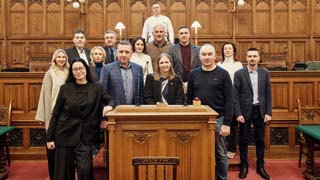Ukrainian delegation in Vienna interested in green technologies
In January 2024, ten Ukrainian municipal representatives learned about sustainable energy solutions as part of the Greenpeace programme "Green Reconstruction of Ukraine".
The one-week visit kicked off with a guided tour of Vienna City Hall, followed by a welcome from Vienna City Council Member Nina Abrahamczik. In the Council Chamber, the Ukrainian guests discussed with her various aspects of Vienna's climate policy, from the new electric stove subsidy to the city's photovoltaic campaign and the thermal building renovation.
The broad interest of the visitors was reflected in a varied programme. Input came from international organisations such as Greenpeace and the Energy Community, as well as private and non-profit organisations. Visits in and around Vienna included the "Wientalterrassen" residential complex, the Sonnenfeld agri-photovoltaic plant, a wind farm in Bruck an der Leitha and the neighbourhood energy sharing community in Vienna's district Liesing.
A variety of insights
The presentations from the City of Vienna also covered a broad range of topics and provided insights into theory and practice. The City of Vienna has set itself the goal of becoming climate-neutral by 2040. One important aspect of achieving this goal is to stop using fossil fuels. The guests learnt exactly how this works during a presentation on the "Phasing Out Gas" initiative, which describes the switch to renewable energies in the heating supply. As a flagship project of this initiative, the delegation visited Europe's most powerful large heat pump at the Vienna Simmering power plant, which supplies 25,000 households in Vienna with climate-friendly district heating.
The Ukrainian representatives learnt more about sustainable energy generation and waste management in the City of Vienna during a tour of a waste disposal site and the biogas plant in Vienna's district Simmering. It is also home to a waste logistics centre and the Pfaffenau waste incineration plant and shows how modern waste management actively contributes to climate protection.
The Department of Environmental Protection (MA 22) presented the City of Vienna's urban greening plan as another important aspect of climate policy. The city's own roof garden served as an illustrative example. The special feature of this project is that the roof garden not only serves as an additional green space and improves the microclimate, but is also a test area for plant species, substrate and seed mixtures. Information signs about the individual beds, special plants and the pond make the roof garden particularly interesting.
Visits to the United Nations headquarters in the Vienna International Centre and Vienna's old town rounded off the busy programme.
Chief Executive Office - European and International Affairs
Contact form

